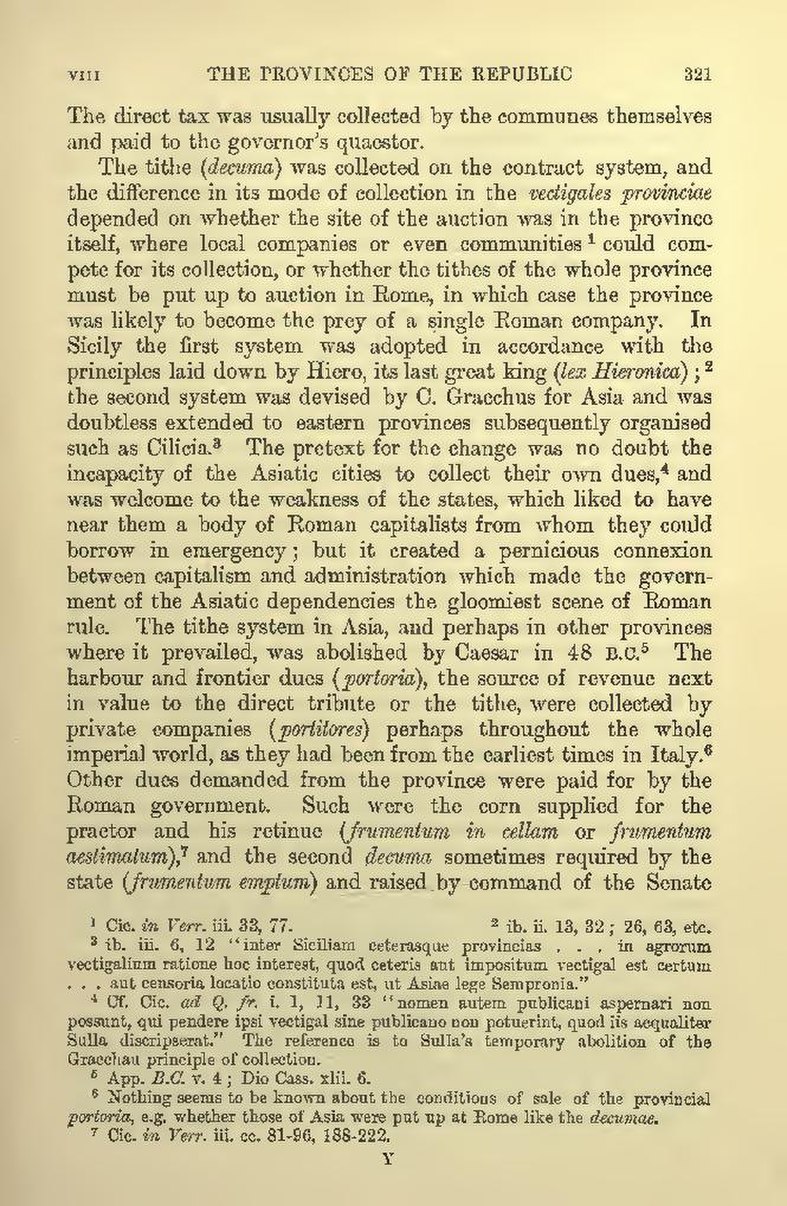The direct tax was usually collected by the communes themselves and paid to the governor's quaestor.
The tithe (decuma) was collected on the contract system, and the difference in its mode of collection in the vectigales provinciae depended on whether the site of the auction was in the province itself, where local companies or even communities[1] could compete for its collection, or whether the tithes of the whole province must be put up to auction in Rome, in which case the province was likely to become the prey of a single Roman company. In Sicily the first system was adopted in accordance with the principles laid down by Hiero, its last great king (lex Hieronica);[2] the second system was devised by C. Gracchus for Asia and was doubtless extended to eastern provinces subsequently organised such as Cilicia.[3] The pretext for the change was no doubt the incapacity of the Asiatic cities to collect their own dues,[4] and was welcome to the weakness of the states, which liked to have near them a body of Roman capitalists from whom they could borrow in emergency; but it created a pernicious connexion between capitalism and administration which made the government of the Asiatic dependencies the gloomiest scene of Roman rule. The tithe system in Asia, and perhaps in other provinces where it prevailed, was abolished by Caesar in 48 B.C.[5] The harbour and frontier dues (portoria), the source of revenue next in value to the direct tribute or the tithe, were collected by private companies (portitores) perhaps throughout the whole imperial world, as they had been from the earliest times in Italy.[6] Other dues demanded from the province were paid for by the Roman government. Such were the corn supplied for the praetor and his retinue (frumentum in cellam or frumentum aestimatum),[7] and the second decuma sometimes required by the state (frumentum emptum) and raised by command of the Senate
- ↑ Cic. in Verr. iii. 33, 77.
- ↑ ib. ii. 13, 32; 26, 63, etc.
- ↑ ib. iii. 6, 12 "inter Siciliam ceterasque provincias . . . in agrorum vectigalium ratione hoc interest, quod ceteris aut impositum vectigal est certum . . . aut censoria locatio constituta est, ut Asiae lege Sempronia."
- ↑ Cf. Cic. ad Q. fr. i. 1, 11, 33 "nomen autem publicani aspernari non possunt, qui pendere ipsi vectigal sine publicano non potuerint, quod iis aequaliter Sulla discripserat." The reference is to Sulla's temporary abolition of the Gracchan principle of collection.
- ↑ App. B.C. v. 4; Dio Cass. xlii. 6.
- ↑ Nothing seems to be known about the conditions of sale of the provincial portoria, e.g. whether those of Asia were put up at Rome like the decumae.
- ↑ Cic. in Verr. iii. cc. 81-96, 188-222.
